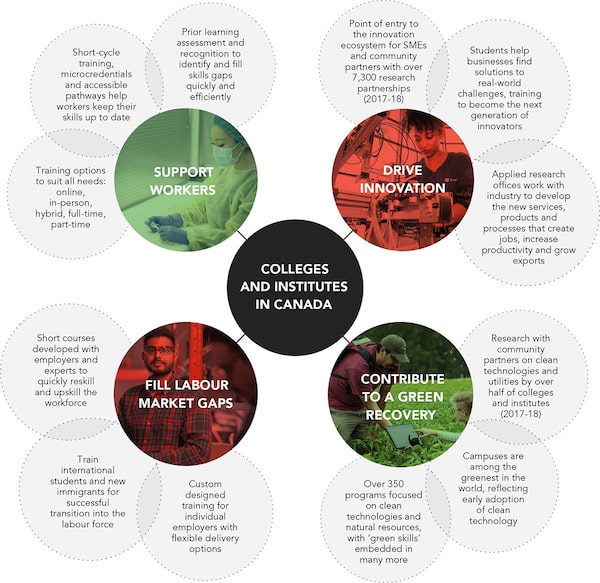
Denise Amyot, President and CEO, CICANSUPPLIED
The pandemic may not yet be over, but with vaccines rolling out, we can be hopeful that the largest health crisis of our generation is abating. Its impacts, however, are extensive, and recovery won’t happen overnight – a large-scale collective effort is needed to help the thousands of Canadians who have lost their jobs and the many businesses struggling to keep afloat. As we rebuild our economy, many will need to rethink their businesses or career path, which is where colleges and institutes come into play.
Over 95 per cent of Canadians live within 50 kilometres of a college, institute, cegep or polytechnic. With their extensive footprint across the country, these institutions have always been able to make a difference in communities from coast to coast to coast. They have stepped up their efforts over the last year, helping in many ways, and are already resolutely looking to the challenges ahead.

Over 95 per cent of Canadians live within 50 kilometres of a college, institute, cegep or polytechnic. Their extensive footprint across the country and close connections to local partners enable these institutions to make a difference in communities from coast to coast to coast.SUPPLIED
During the COVID-19 pandemic, colleges and institutes have shown resilience and creativity, pivoting quickly to meet the needs of their students and communities through online instruction, providing applied-research services to local businesses re-tooling their operations for the production of PPE or new products, offering free online training to individuals and SMEs affected by the crisis, and donating food, shelter and more to those in need. It is at times like these that the integral place of colleges and institutes at the heart of their communities is so apparent.
What other national network was able to work with local entrepreneurs to deliver solutions to the COVID-19 crisis? For example, Durham College worked with Health Espresso to build a platform connecting community health-care organizations for a patient-centred approach. The system was quickly deployed at the Central Pickering Family Practice, serving 67,000 patients, and at a COVID Testing Centre in Pickering to communicate COVID test results.
“Helping Canadian businesses, particularly SMEs, innovate and grow by leveraging the full potential of college and institute applied research capacity is also critical as we look to build a resilient and sustainable economy while also tackling pressing environmental challenges.
This college and institute ingenuity will be just as important for business and individuals as we look to recover from the social and economic impacts of the pandemic.
Canadian businesses have had to close their doors as lockdown orders were implemented, while those that remained open have had to rethink some of their most basic functions. The pandemic has been especially hard on SMEs, many of which still face an uncertain future. To get them back on track, they will need access to skilled workers and innovation services. Not just to adapt to the challenges of the pandemic, but to rebuild their businesses in a landscape that will be forever changed.
Helping Canadian businesses, particularly SMEs, innovate and grow by leveraging the full potential of college and institute applied research capacity is also critical as we look to build a resilient and sustainable economy while also tackling pressing environmental challenges. Colleges and institutes’ long history of supporting innovation through applied research projects to solve real-world challenges will be critical.

Whether it’s by helping Canadians find career success, enabling industry and community partners to adapt to changing market conditions or boosting innovation, colleges and institutes play an essential role in advancing an inclusive and resilient recovery.SUPPLIED
For individuals, colleges and institutes offer over 10,000 programs and are the main providers of upskilling and reskilling opportunities, including thousands of short programs and micro-credentials, something that will be especially valuable for displaced workers looking to relaunch their careers. With the pandemic affecting already vulnerable populations, offering flexible and accessible training opportunities will be all the more important. Part of the solution is to use prior-learning assessment and recognition, which is already commonly used by colleges and institutes to ensure learners select training options that precisely target their skills gaps and career goals without spending time learning skills they have already mastered.
All college and institute programs are developed in close consultation with local employers and experts to ensure they meet labour market needs. This means that college curriculums are regularly updated to take new realities into account. That flexibility has always been one of the greatest strengths of Canadian colleges and institutes and will be an invaluable asset as we seek to support an inclusive and resilient recovery.
Though the challenges ahead remain significant, we can be confident that by working together, we can support a recovery-ready workforce, help Canadians return to work, and boost innovation. Colleges and institutes are certainly up to the challenge, as they have proudly shown throughout the past year.
Advertising feature produced by Randall Anthony Communications with Colleges and Institutes Canada. The Globe’s editorial department was not involved.